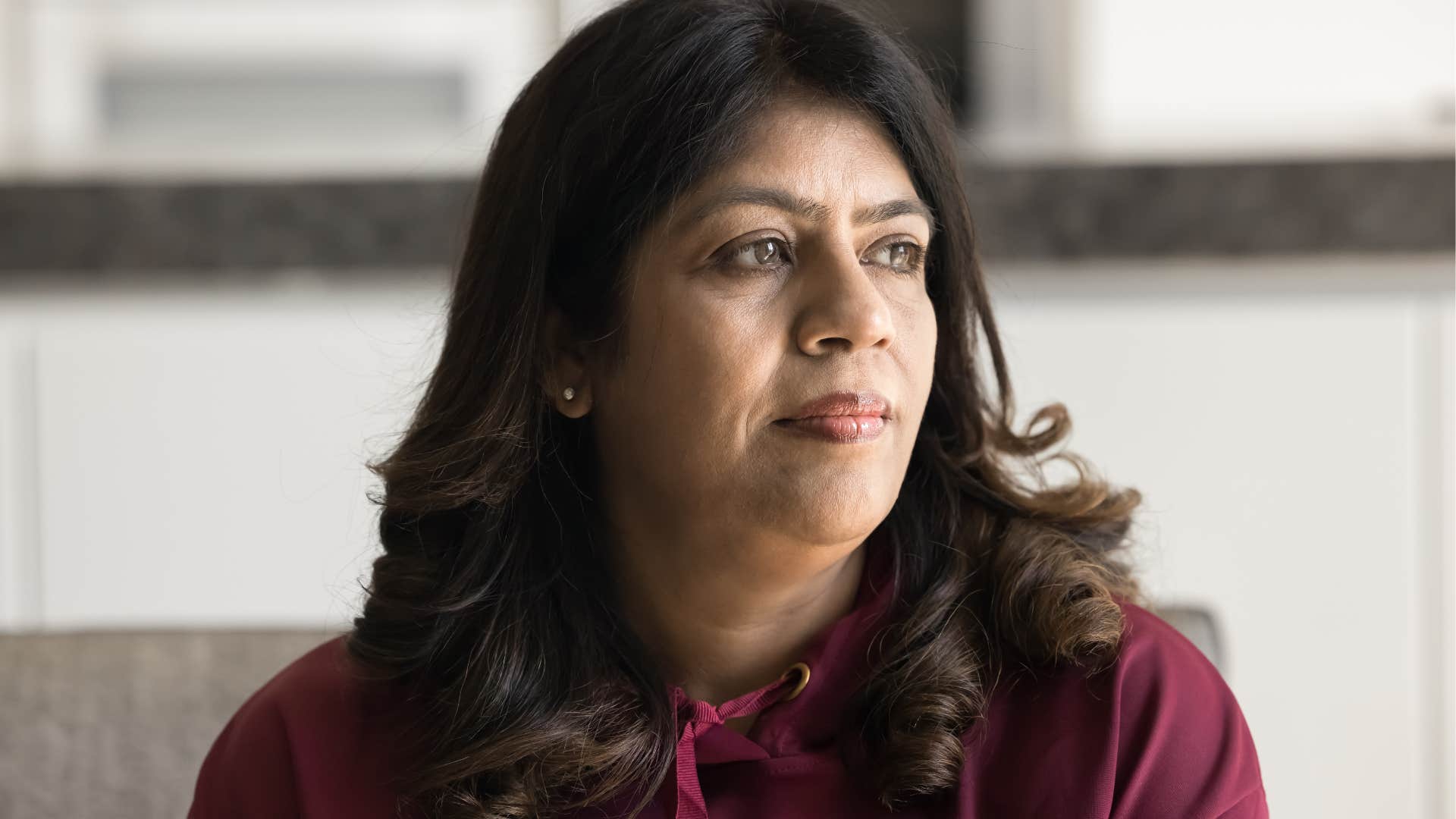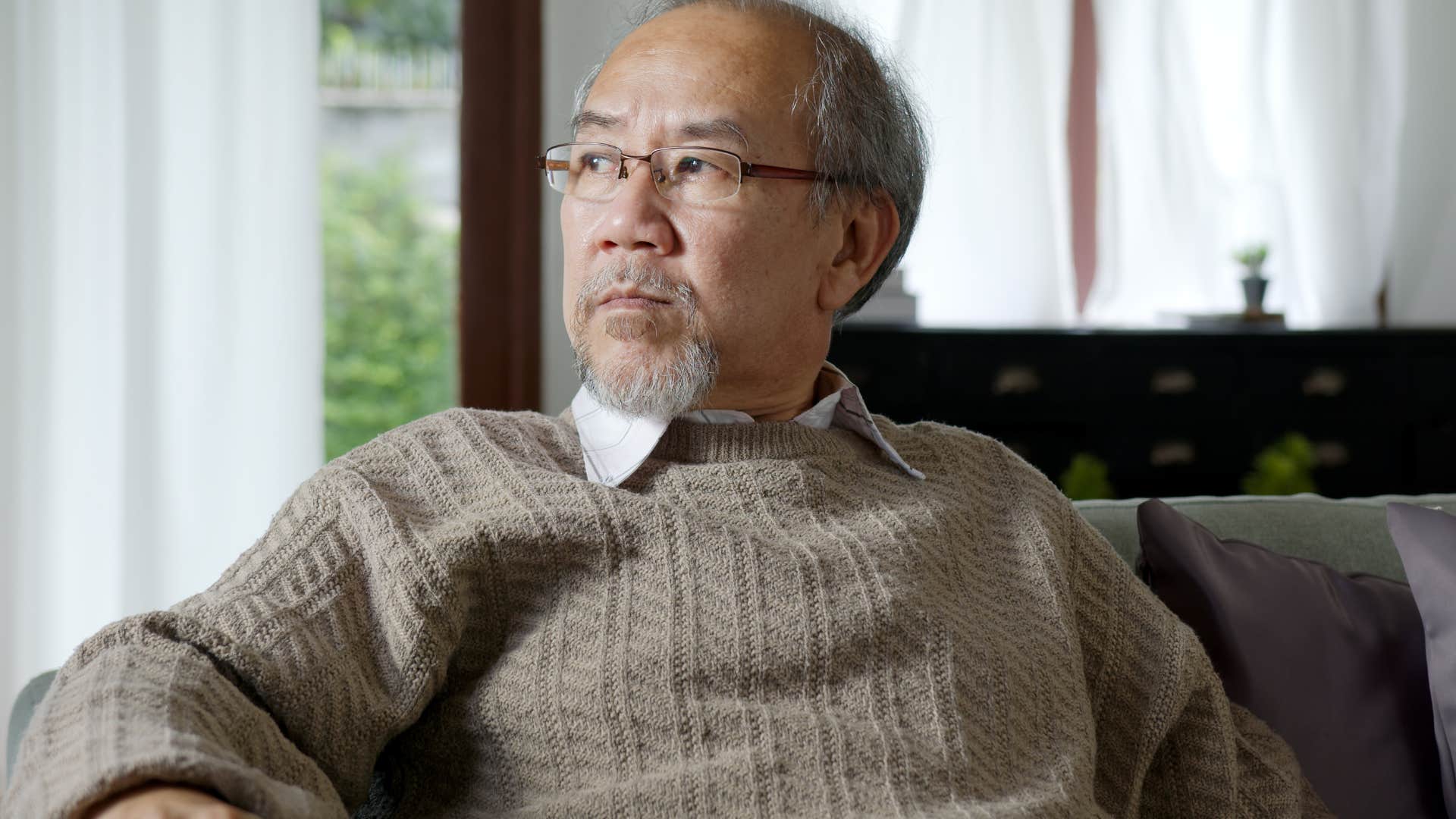11 Quiet And Painful Things That Happen When You Don't Feel Close To Your Parents Anymore
Are you grieving the loss of people who are still around?
 MAYA LAB | Shutterstock
MAYA LAB | Shutterstock Many parents maintain a close and intimate relationship with their adult children later in life, especially after overcoming the initial distance and separation adulthood sparks when they leave their home for the first time, according to a study from Pew Research Center. With regular quality time, healthy boundaries, and open communication, it's these parent-child relationships that tend to thrive; however, it's also not uncommon for people to grapple with the consequences of disconnection.
In fact, many of the quiet and painful things that happen when you don't feel close to your parents anymore are rooted in resentment, an experience that can manifest itself in uncomfortable and unexpected ways. Whether it's a side effect of going "no contact" with your parents or simply not having the time to invest in checking in, recognizing these symptoms can help you to heal and cultivate the kinds of connections necessary for your well-being.
Here are 11 quiet and painful things that happen when you don't feel close to your parents anymore
1. You feel misunderstood
 Perfect Wave | Shutterstock
Perfect Wave | Shutterstock
Whether it's by your parents when they're around or by other relationships in your life, feeling disconnected from your parents can promote a chronic sense of being misunderstood. As an adult, when you're feeling disconnected from your family — the people who typically know you, your history, and your personality best — it can feel like something is "missing," especially in big moments in your life.
Feeling misunderstood is a powerful experience that can influence stress levels, life satisfaction, and happiness in negative ways, according to a study from the Journal of Social and Personal Relationships. So, even when it feels like a subtle nagging feeling as you navigate your daily life, it's still one of the painful things that happen when you don't feel close to your parents anymore.
2. You're conflicted about reaching out
 Africa Studio | Shutterstock
Africa Studio | Shutterstock
Resentment often makes us feel a range of emotions, from nostalgia for the past version of someone, to sadness for missing them, and sometimes even guilt. In the long-term, harboring resentment, avoiding forgiveness, and suppressing emotions can have more than just a mental toll, it can also sabotage physical health and spark ailments and disease.
It's confusing and complex to experience resentment toward your parents, especially in adulthood, which is why it's one of the painful things that happen when you don't feel close to your parents anymore. You may be longing for a version of them that no longer exists or even trying to justify their misbehavior for the sake of affection, but at the end of that day, it's a conflicted attitude that lingers.
3. You struggle with regulating emotions
 PeopleImages.com - Yuri A | Shutterstock
PeopleImages.com - Yuri A | Shutterstock
According to a study from the Clinical Child and Family Psychology Review, being disconnected from your family or dealing with a family member that doesn't openly communicate their feelings can spark emotional dysregulation in everyone involved. You not only feel the burdens of resentment brewing from not having a safe space to communicate, you're often forced to suppress your own emotions and needs.
It's one of the quiet and painful things that happen when you don't feel close to your parents anymore, because your needs and emotions don't simply go away when they're not recognized or supported by your family.
4. You find it difficult to trust people
 TetianaKtv | Shutterstock
TetianaKtv | Shutterstock
Many children who have emotionally detached and mistrusting relationships with their parents in adulthood grew up with unmet needs early in life, according to a 2021 study. Whether it was an authoritarian parent or vague boundaries, adult children who feel disconnected from their parents early in life still cope with the lingering aftershocks of those experiences and lessons in their relationships today.
Another study from BMC Public Health found that adult children who grew up without healthy models of relationships and unmet needs from their parents tend to struggle building meaningful relationships now. They struggle trusting people, especially now that they feel disconnected and disengaged from their parents today.
5. You avoid talking about them
 Wasana Kunpol | Shutterstock
Wasana Kunpol | Shutterstock
Whether you're going "no contact" or struggling with unresolved trauma from your childhood in another way, avoiding talking about your family is one of the painful things that happen when you don't feel close to your parents anymore.
It can be uncomfortable to have open conversations about your family, especially when you're still battling resentment and a complex array of emotions — from guilt to embarrassment — about your relationships, which is why some people resort to avoidance.
6. You dread family gatherings
 PeopleImages.com - Yuri A | Shutterstock
PeopleImages.com - Yuri A | Shutterstock
For many people, family gatherings and holidays are not comforting and exciting, but rather anxiety-inducing and stressful, according to experts from Michigan State University. Especially for people dealing with a lack of closeness to their parents or a complicated family dynamic, working up the courage to have conversations and interact with family members can feel overwhelming.
Even when they're yearning for a better relationship or an honest conversation with their parents, holidays and family gatherings can feel too stressful to even consider them.
7. You seek external validation
 fizkes | Shutterstock
fizkes | Shutterstock
When you grew up with unmet needs or still struggle with confidence as an adult, it's not uncommon to resort to attention-seeking behaviors or external validation to cope. Many people have a safe space with their parents for emotional support and open communication, but those that don't may struggle with trying to find it in the wrong places.
For many adults, that means repeating a cycle of toxic relationships and sabotaging healthy ones by searching for validation, rather than unconditional affection or trust.
8. You're hyper-independent
 fizkes | Shutterstock
fizkes | Shutterstock
According to relationship coach Annia Tanasurgarn, hyper-independence is often a trauma response to having unmet needs or being parentified too early in life. For many people who struggle to have a healthy relationship with their parents in adulthood, it's rooted in some kind of trauma similar to this — they don't feel supported, valued, or heard.
To compensate for that lack of connection and communication, they become self-reliant, sometimes to a fault, avoiding vulnerability with others, struggling to trust, and bearing the burden of their responsibilities completely on their own.
9. You miss 'home'
 Ground Picture | Shutterstock
Ground Picture | Shutterstock
Even if "home" isn't necessarily a place or a person from your family anymore, many people who feel disconnected from their families still yearn for that sense of innate community and belonging.
Considering parental relationships are often the key to fostering belonging at home, according to a study from the Journal of Marriage and Family, it's not surprising that this experience is one of the quiet and painful things that happen when you don't feel close to your parents anymore.
10. You feel lonely
 Chay_Tee | Shutterstock
Chay_Tee | Shutterstock
Especially for people struggling to cultivate healthy personal relationships in adulthood and find their community, not having a close connection with parents can be isolating. You're not only watching everyone else in your life — from friends to social media followers — post about and share their families, you're grappling with huge life moments on your own.
Of course, it's possible to find a chosen family, but for those that haven't yet, this loneliness is one of the quiet and painful things that happen when you don't feel close to your parents anymore.
11. You look back on memories
 fizkes | Shutterstock
fizkes | Shutterstock
Even though it's possible to reach out and connect with your parents or create new memories, one of the painful and quiet things that happen when you don't feel close with them anymore is leaning on memories for a sense of comfort and nostalgia.
While it's true that good memories and positive nostalgia can help you to cope with the discomfort of a toxic or disconnected family dynamic, it can also bring back memories that are less than favorable, urging you to fall deeper into a spiral of confusion and loneliness.
Zayda Slabbekoorn is a staff writer with a bachelor’s degree in social relations & policy and gender studies who focuses on psychology, relationships, self-help, and human interest stories.

